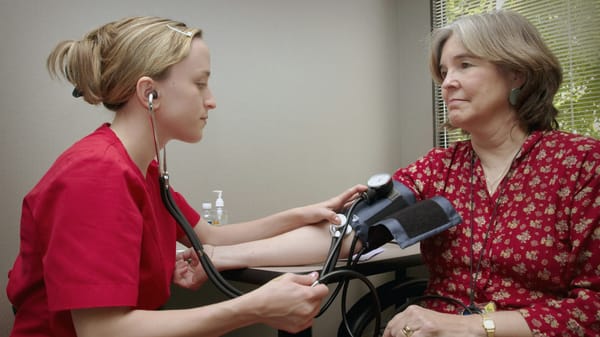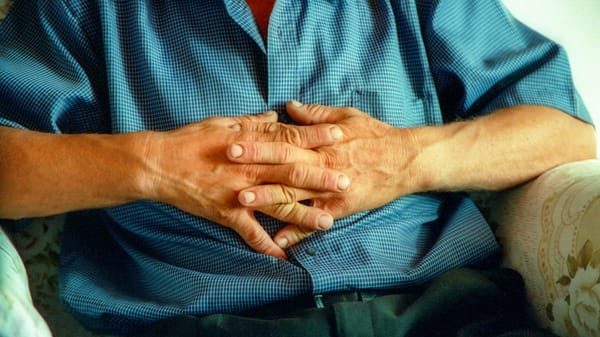Mind, Body, Health: Understanding the Powerful Interconnections That Define Well-being
How does anxiety trick your body into feeling sick? We aim to fill the gap between scientific research and everyday understanding, giving you the knowledge to make informed decisions about health.

Did you know that 1 in 5 individuals with anorexia also suffer from severe malnutrition, a condition often worsened by the hidden impact of health anxiety?
Health and well-being are at the core of human existence, influencing every aspect of our lives. From the physical challenges posed by malnutrition to the psychological complexities of health anxiety, understanding the interplay between these factors is crucial for both medical professionals and for us as individuals. This blog looks into a variety of health topics. This time, we are going to look a bit more into anorexia nervosa, malnutrition, and health anxiety, while also exploring the surprising ways such everyday things like love and even ginger can impact our overall health.
Anorexia nervosa, for instance, is not just an eating disorder but a condition with severe physical and psychological repercussions. Similarly, malnutrition—whether due to undernutrition or overnutrition—affects immunity, cognitive function, and long-term development. On the other hand, health anxiety demonstrates how deeply our mental state can influence physical symptoms, blurring the lines between psychological and physiological health. The scope is broad, and the truth is that both internal and external factors may develop these conditions.
But it’s not all grim. Love, often seen as an emotional phenomenon, has tangible effects on mental and physical health. It can boost immunity, reduce stress, and even improve cardiovascular health. Meanwhile, ginger, just a simple spice, offers huge and unexpected benefits ranging from anti-inflammatory properties to blood sugar regulation.
How does anxiety trick your body into feeling sick? Can a simple spice like ginger transform your health? We aim to fill the gap between scientific research and everyday understanding, giving you the knowledge to make informed decisions about health and, in this article, all related to specific conditions.
Anorexia: How to Break the Cycle of Perfectionism
Health is more than just the absence of illness—it’s a delicate balance between our physical, mental, and emotional well-being. When one aspect is wrong or there is a weak spot, it can tear apart our lives, affecting not only how we feel but also how we connect with others and go through our daily routines. Among the many health challenges people face, anorexia nervosa stands out as a particularly complex and deeply personal struggle. It’s not just about food or weight; it’s about identity, control, and often the silent battles we fight within ourselves. We are going to look into the risks associated with anorexia and the broader implications of malnutrition, as well as external factors. We hope to foster understanding, compassion, and actionable insights for those navigating these challenges.
Health Risks Associated with Anorexia
Anorexia nervosa is an eating disorder that goes far beyond dieting or body image concerns. It’s a condition marked by extreme food restriction, an intense fear of gaining weight, and a distorted view of one’s body. For those who’ve experienced it—or watched a loved one go through it—it’s clear that anorexia isn’t just a personal struggle; it affects families, and friendships, and it is deeply ingrained in our society. Physically, the impact is immense.
Nutrient deficiencies can leave the body starved of essential vitamins like calcium and iron, leading to brittle bones, weakened immunity, and chronic fatigue. The heart suffers too—slow heart rates (bradycardia), low blood pressure (hypotension), and irregular rhythms can turn life-threatening without intervention.
But the effects aren’t just physical. The mental effects are very important too and they can stop you from recovering. Anorexia often coexists with anxiety or depression, creating a cycle that feels impossible to break. It isolates people from their loved ones and from life itself. Over time, the damage can become permanent—organ failure, infertility, or irreversible bone loss are real risks.
But anorexia isn’t just about individual health; it reflects societal pressures around beauty standards and perfectionism. For someone who sets high standards for themselves, this condition can feel like a “salvation” when you start struggling with it, and that’s the difficult part about it: how to break the never-ending cycle of perfectionism?
Recovering from anorexia is not easy—it takes time, support, and understanding. But by talking about it openly and addressing its complexities with empathy, we can help break the stigma surrounding this condition. No one should face this alone.
- Physical Impacts: Nutrient deficiencies leading to brittle bones, weakened immunity, chronic fatigue, slow heart rate (bradycardia), low blood pressure (hypotension), irregular heart rhythms, potential for organ failure, infertility, and irreversible bone loss.
- Psychological Impacts: Co-occurrence with anxiety and depression, isolation, the difficulty of breaking the cycle, and links to perfectionism.
- Complexity: It emphasizes that it's more than just about food or weight, involving identity and control.
- Highest Mortality Risk: Beyond being potentially life-threatening due to complications like cardiac issues, anorexia nervosa carries one of the highest mortality rates among all psychiatric disorders. This elevated risk stems from both the severe physical effects of starvation, such as cardiac arrest or critical electrolyte imbalances, and a significantly increased rate of suicide compared to the general population.
- Widespread Bodily Harm: The nutrient deprivation inherent in anorexia impacts virtually every major organ system. The brain can experience structural changes and cognitive impairments. The heart suffers from slowed rates, low pressure, and dangerous arrhythmias. Bones lose density, becoming brittle and prone to fractures (osteoporosis). Kidney function can decline, potentially leading to failure.
- Neurological Impact: Severe malnutrition associated with anorexia can lead to measurable changes in brain structure, including a reduction in grey and white matter, although some recovery is possible with nutritional rehabilitation. Cognitive functions like attention, concentration, decision-making (executive function), and processing speed are frequently impaired.
- Inherent Malnutrition: While health anxiety can complicate the picture, the core definition of anorexia nervosa involves restriction leading to significantly low body weight. This state is, by nature, severe malnutrition, bringing with it all the associated dangers of nutrient deficiencies and energy deficit.
- The Danger of Refeeding: A critical risk, particularly when starting nutritional recovery, is refeeding syndrome. In severely malnourished individuals, the reintroduction of nutrients can cause rapid, dangerous shifts in fluids and electrolytes (especially phosphate). This can lead to severe complications like heart failure, respiratory failure, seizures, and even death if not managed meticulously by experienced medical teams. This underscores the physiological fragility caused by the illness.
- Potential for Chronicity: Recovery is achievable, yet for many, anorexia nervosa can become a chronic or relapsing condition. This long-term struggle significantly diminishes quality of life over years, impacting relationships, education, career paths, and overall well-being.
- Deeply Entrenched Psychological Aspects: The distorted thoughts, intense fears (especially around weight gain), and compulsive behaviors associated with anorexia become deeply ingrained. This often makes it difficult for individuals to recognize the severity of their own illness or to fully engage with treatment, adding another layer to the condition's dangerousness.
Hunger: Understanding Malnutrition and the Anxiety-Body Connection
In the previous section, we explored the challenges of anorexia, recognizing that it's a complex issue far beyond just food and weight. But even when eating disorders aren't a factor, our bodies can suffer from a lack of essential nutrients or an overabundance of unhealthy foods. Malnutrition affects us all, and it takes more than just eating too little (undernutrition) or too much (overnutrition). It’s about getting the right balance of vitamins, minerals, and other nutrients that allow our bodies to function properly.
When we are malnourished, whether from under or overeating, our immune system is affected, and we become more vulnerable to all kinds of illnesses. Protein deficiency causes muscle wasting, which makes it harder to be active and can affect our overall strength. Our minds suffer as well; cognitive decline becomes more common, especially among children and the elderly, who may experience memory loss or difficulty concentrating. A lack of iron can lead to anemia, leaving us feeling tired and short of breath, while vitamin D deficiency can weaken our bones. And the mental impact of malnutrition is significant – irritability, low mood, and even depression can be linked to nutritional deficiencies.
Meanwhile, the mind can play tricks on us too. Many people experience what’s known as health anxiety, or hypochondria, where they become excessively worried about having a serious illness, even when physical symptoms are minimal or nonexistent. The mind and body are closely linked, so these anxieties can manifest in very real ways. Our digestive systems might become upset, causing nausea, bloating, or discomfort. Our heart rates may increase, blood pressure may rise, and chest tightness can occur, mimicking the symptoms of a heart condition.
Some people may experience shortness of breath, hyperventilation, muscle tension, and pain. These symptoms are caused by the activation of the autonomic nervous system, which responds to stress and anxiety. Treatment options are available, including therapy like CBT, medications to manage anxiety, and stress-reduction techniques like mindfulness and relaxation exercises. Understanding that these anxieties are real and valid, and seeking professional help, is the first step toward feeling better.
Love, Laughter, and Ginger: Finding Health in Unexpected Places
After talking about the difficulties of malnutrition and health anxiety, it's time to talk about some things which could benefit our well-being in unexpected ways. For example, can love make us healthier? Science suggests it might! Falling in love triggers a lot of psychological and physiological changes. Our bodies release endorphins and oxytocin, "feel-good" chemicals that promote happiness, reduce stress, and strengthen our emotional bonds.
Positive relationships have also been linked to improved immune function, helping us recover more quickly from illness. And there's evidence that the emotional support we receive from a partner can lower blood pressure and reduce the risk of cardiovascular disease. Of course, relationships aren't always smooth. Conflict and stress can impact our well-being, and dysfunctional relationships can contribute to anxiety and depression. But the positive aspects of love and connection shouldn't be overlooked when we're considering our overall health. Connections are always important, especially when it comes to our health.
What can we do to improve our health, if we have the chance to do it? It’s all about the power of social connection. When we're happy and feeling good, we're more likely to engage in fun activities that bring us joy. Karaoke, dancing, or any kind of group activity can be a great way to reduce stress, boost our mood, and release endorphins. These activities strengthen our social bonds, building trust and camaraderie in our relationships, including our romantic ones. It's a reminder that our social lives are just as important to our health as what we eat and how we exercise. Just be mindful of overindulging in unhealthy behaviors like excessive drinking at social gatherings.
And speaking of health boosts, let's not forget about ginger. This spice has been used for centuries in traditional medicine systems like Ayurveda and Traditional Chinese Medicine. Modern science is now catching up to these ancient practices, confirming ginger's powerful health benefits. Ginger has potent anti-inflammatory properties, thanks to active compounds like gingerol, which can help alleviate pain and stiffness in conditions like osteoarthritis and rheumatoid arthritis.
It's also a fantastic digestive aid, helping to relieve nausea, reduce bloating, and promote healthy digestion. Studies suggest that ginger may even be as effective as some over-the-counter pain relievers in reducing muscle soreness and other types of pain. It's rich in antioxidants, which protect our cells from damage and may reduce the risk of chronic diseases.
Emerging research also suggests that ginger may help regulate blood sugar levels, making it a valuable addition to the diets of people with type 2 diabetes. As with any supplement, it's essential to use ginger in moderation and be aware of potential side effects or interactions with medications. But incorporating this spice into your diet is a simple way to support your overall well-being.
Integrating Knowledge, Compassion, and Holistic Care
We've gone through a wide range of topics, from anorexia and malnutrition to the surprising health benefits of love, laughter, and ginger. Anorexia nervosa, we've seen, is far more than a simple eating disorder; it's a deeply personal struggle with profound physical and psychological consequences. Malnutrition, whether from too little or too much food, affects our immunity, cognitive function, and mood.
Health anxiety can manifest in very real physical symptoms, highlighting the power of the mind-body connection. On a brighter note, we've discovered that love can release feel-good chemicals, boost our immune system, and improve our heart health. Social connections, like those fostered through karaoke, can reduce stress and promote joy. And the humble spice ginger offers anti-inflammatory, digestive, and antioxidant benefits.
For healthcare professionals, the insights shared here underscore the importance of staying informed about emerging research and considering all these factors when providing patient care. Incorporating evidence-based interventions and therapies for conditions like anorexia and health anxiety is essential, but so is recognizing the potential benefits of positive relationships, social connections, and natural remedies like ginger. We must approach health with a holistic perspective, acknowledging the interplay between physical, mental, and emotional well-being.
My Personal Experience and Finding My Way Back: From Anorexia to a Life of Balance
As the author of this article, I wanted to share a piece of my own story, hoping it sounds familiar and is helpful for anyone struggling with similar challenges. For years, I was caught in a cycle probably started by societal pressures—a pursuit of perfection and an obsession with body image that led me down the path of anorexia. It felt like I was constantly fighting against myself, since my worth was measured by the numbers on a scale.
Breaking free was the hardest thing I’ve ever done, but I wouldn’t have managed alone. It took the support of my family, friends, and dedicated professionals to begin breaking the patterns of disordered thinking. They helped me challenge those beliefs and start rebuilding my self-esteem from the inside out. But even years into recovery, some of those old obsessive patterns still lingered. If you are a perfectionist, you probably have this kind of trouble if you have dealt with an eating disorder before.
Then, love entered my life, and I have to say that it was more useful and healing than I thought. My partner's relaxed approach to food and his dedication to healthy living, without any of the rigid rules I'd once imposed on myself, was very eye-opening for me. Seeing his joyful relationship with food helped me finally get rid of the last traces of my eating “rules”.
It was a powerful reminder that health isn't about restriction or perfection; it's about balance, nourishment, and, most importantly, self-compassion. And it wasn't just his influence, but also all the love and support I had received over the years, from the people who stood by me through thick and thin. That combination helped me fully break free from those obsessive patterns. Building deep connections is what is gonna help you the most. Not just with anorexia or anxiety, but with everything.
Your Top Questions Answered
Based on the questions and discussions surrounding this article, here are some of the most frequently asked questions, answered to provide further clarity and actionable insights:
- What are the first steps someone should take if they suspect they have anorexia nervosa?
The most important first step is to reach out to a healthcare professional. This could be a doctor, therapist, or registered dietitian specializing in eating disorders. Early intervention is crucial. Also, connecting with support groups or online communities can provide valuable emotional support. - How can I tell the difference between normal anxiety and health anxiety?
Everyone experiences anxiety from time to time. Health anxiety, however, is characterized by excessive and persistent worry about having a serious illness, even when there are no or minimal symptoms. It often leads to repetitive checking behaviors (like constantly monitoring your body for signs of illness) and seeking reassurance from doctors. If these worries are significantly impacting your daily life, it's worth speaking with a mental health professional. - What are some affordable ways to improve my nutrition if I'm on a tight budget?
Focus on whole, unprocessed foods like beans, lentils, eggs, and seasonal fruits and vegetables. Buy in bulk when possible, and consider frozen fruits and vegetables, which are often more affordable than fresh options and just as nutritious. Planning meals ahead of time can also help reduce food waste and impulse purchases. - Can ginger really help with nausea during pregnancy?
Yes, many studies have shown that ginger can be effective in alleviating nausea and vomiting during pregnancy. However, it's always best to consult with your doctor or midwife before taking any supplements, including ginger, to ensure it's safe for you. - Is it possible to have a healthy relationship with food after recovering from an eating disorder?
Absolutely. It takes time, patience, and a lot of self-compassion, but a healthy relationship with food is definitely achievable. It involves letting go of restrictive rules, learning to listen to your body's cues, and finding joy in nourishing yourself. Working with a registered dietitian or therapist specializing in eating disorders can be incredibly helpful in this process. - What if I can't afford therapy for health anxiety?
There are many resources available, including community mental health centers, online therapy platforms (some offer sliding scale fees), and self-help books based on cognitive-behavioral therapy (CBT) principles. Practicing mindfulness and relaxation techniques can also be helpful in managing anxiety symptoms. - How much ginger should I consume to experience its health benefits?
A typical dose of ginger is around 1 gram per day. This can be consumed in various forms, such as fresh ginger root, ginger tea, capsules, or powder. However, it's important to start with a lower dose and gradually increase it to see how your body responds. - Are there any risks to taking ginger supplements?
Ginger is generally safe for most people, but high doses can cause mild side effects such as heartburn, diarrhea, or abdominal discomfort. Ginger may also interact with certain medications, such as blood thinners, so it's important to talk to your doctor before taking ginger supplements, especially if you have any underlying health conditions or are taking medication. - How can I support a loved one who is struggling with anorexia?
The most important thing is to offer your unconditional love and support. Let them know that you care about them and are concerned about their well-being. Avoid making judgmental comments about their eating habits or appearance. Encourage them to seek professional help, and be patient and understanding throughout the recovery process. - What role does society play in the development of eating disorders?
Societal pressures related to body image and perfectionism play a significant role in the development of eating disorders. These pressures can create a culture of body dissatisfaction and dieting, which can increase the risk of developing an eating disorder. Media literacy, body positivity movements, and open conversations about these issues are essential in challenging these harmful norms.
Key Takeaways
- Anorexia is a Complex Struggle: Anorexia nervosa goes beyond dieting; it's a serious mental health condition with significant physical and psychological consequences requiring professional help.
- Malnutrition Impacts More Than Just Weight: Whether it's undernutrition or overnutrition, malnutrition weakens immunity, impairs cognitive function, and affects mood. Focus on balanced nutrition for overall health.
- Anxiety Can Manifest Physically: Health anxiety can trigger real physical symptoms like gastrointestinal issues, increased heart rate, and muscle tension. Seek support and stress management techniques.
- Love and Connection Boost Health: Positive relationships release feel-good chemicals, improve immune function, and support heart health. Prioritize nurturing meaningful connections.
- Social Activities Reduce Stress: Engaging in fun activities like singing karaoke can lower stress levels, release endorphins, and strengthen social bonds.
- Ginger is a Powerful Natural Remedy: Ginger has anti-inflammatory, digestive, and antioxidant properties. Consider incorporating it into your diet for potential health benefits.
- Holistic Care is Essential: Healthcare should consider the interplay between physical, mental, and emotional well-being for comprehensive patient care.
- Recovery From Anorexia is Possible: With support, therapy, and a focus on self-compassion, individuals can break free from disordered eating patterns.
- Societal Pressures Impact Health: Be mindful of societal pressures related to body image and perfectionism, as they can negatively affect mental and physical health.
- Self-Acceptance is Key: Prioritize self-acceptance and balanced living over restrictive or obsessive behaviors for a healthier, happier life.
References
https://pmc.ncbi.nlm.nih.gov/articles/PMC3150158/
https://pmc.ncbi.nlm.nih.gov/articles/PMC3635122/
https://pmc.ncbi.nlm.nih.gov/articles/PMC7019938/
https://pubmed.ncbi.nlm.nih.gov/31859542/
https://www.nationaleatingdisorders.org/
https://www.proquest.com/docview/218152609
https://www.who.int/data/gho/data/themes/topics/joint-child-malnutrition-estimates-unicef-who-wb
This article was written by Ariadna Paniagua, an experienced writer and editor for several institutions, papers, and websites.




